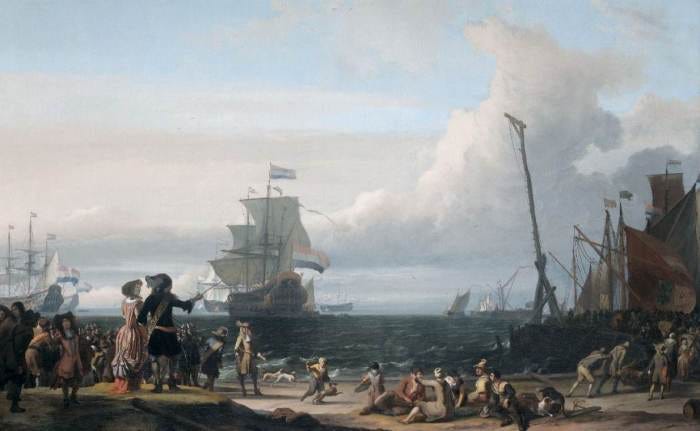Three hundred years of firm myopia
Three centuries ago, on 24 June 1716, a very important letter arrived from Amsterdam in Cape Town; a letter that, according to John X Merriman two centuries later, would change the future of what would become South Africa. Written by the Board of the Dutch East India Company (the VOC), the letter requested the Council of Policy in Cape Town to reflect on the economic needs of the still small and fragile colonial settlement. In particular, the Board wanted to know whether the Council of Policy would recommend more European immigration to the Cape or whether an increase in slave arrivals would be preferred.
A year later, seven members of the Council responded. Six members recommended that slavery was the better choice. The reason was simple: slaves could supply cheaper labour than European wage labourers. And because all agricultural output had to be sold to the Company stores in Cape Town, cheap labour meant that the Company could pay farmers less for their produce, allowing the Company to make a very decent return when reselling the produce to passing ships.
One member of the Council of Policy, however, disagreed. Dominique Marius Pasques de Chavonnes instead made a case for encouraging European immigrants. Though slavery would be more profitable in the short run, he argued that the settlement of free people would be better for the economy, and thus for the Company, in the long run. Free men have an incentive to invent while slaves do not, he said, pre-empting what Adam Smith would write in his Wealth of Nations half a century later. And invention is the root of productivity and prosperity.
It’s no surprise that the shareholders in Amsterdam chose the advice of the six men that appealed to their immediate interests. After 1717, European immigration slowed considerably, and slave arrivals from modern-day Malaysia, Indonesia, India, Madagascar and Mozambique increased. The Cape became a slave economy, with high levels of inequality, an inequality that has still not abated. In 1776, Adam Smith would write in his Wealth of Nations that ‘of all the expedients that can well be contrived to stunt the natural growth of a new colony, that of an exclusive company is undoubtedly the most effectual’. DM Pasques de Chavonnes and Adam Smith had recognized the myopia of firms.
Although it has a long history, such short-termism is rising. The trend towards financialisation (higher levels of stock liquidity), diversification and hostile takeovers of the 1980s increased the separation between firm ownership and control. Managers’ incentives to maximise their own utility were no longer aligned with maximising the utility of the firm. To realign these incentives, managers were increasingly compensated with stock options. The result has been a sole focus on higher share prices to the detriment of the long-term sustainability and growth of the firm, for example, by investing less in research and development.
There is now evidence that clearly shows the negative impact of financialisation on innovation. A 2014 paper in the Journal of Finance use exogenous variation in liquidity generated from financial regulation and finds that an increase in liquidity causes a reduction in future innovation. The authors propose two possible reasons: a higher likelihood of hostile takeovers and more institutional investors, like pension funds, who rely on less information and monitoring. The consequences are that short-term boosts in shareholder value come at the expense of the long-term profitability of the firm.
So what can be done to prevent managers from succumbing to these short-term pressures? One solution is to offer managers contractual protection like severance pay agreements. This seems to have a positive impact on innovation; Xia Chen and co-authors of a 2015 paper in The Accounting Review, find that firms with CEO contractual protection are less likely to cut R&D expenditure to avoid earnings decreases. They are also less likely to engage in real earnings management. More detailed analysis reveals that the larger the duration and monetary strength of the agreement, the less likely the CEO is likely to cut R&D expenditure. The effect is also larger for firms in more homogeneous industries, and for firms with higher transient institutional ownership.
Hedge funds and their supporters are eager to point out that not all short-termism is bad and that the evidence on various firm outcomes is mixed. That may be true, but what the recent evidence begins to suggest is that at least one factor that we associate with sustainable firms – innovation – seems to suffer when managers’ priorities shift from the future to the present. Managers that focus too much on short-term gains may, much like the VOC shareholders three-hundred years ago, shift a firm down a path from which it is unlikely to return.
*An edited version of this first appeared in Finweek magazine of 17 March. Image source: Christiaan Josi.


